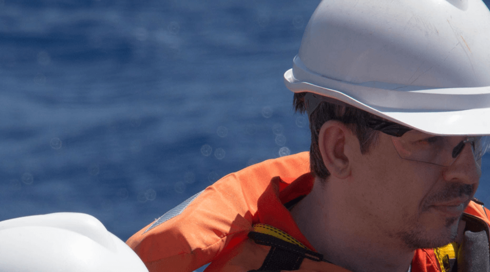2
Every day for decades our professionals and clients have worked at the frontier of Energy, Marine and Renewables in the marine environment. With this in mind, you would imagine that this work environment was fully understood. However, more than 80% of our oceans are unmapped, unobserved, and unexplored! That’s a significant gap in the knowledge of our home planet, especially considering that the oceans cover 70% of Earth.
Additionally, these oceans contain an abundance of another underutilised commodity: Power! We have a lot to learn and a new industry to establish when it comes to harnessing the power of the sea. Which innovations are out there to bridge this gap? As part of the ‘A Look into the Future’ series, Atlas’ Market Analyst Gurpreet Kaur investigates the innovative world for ROVs, AUVs and remote operations.
Automation
To have offshore infrastructures such as pipelines or platforms, the seabed environment must be surveyed and continually inspected. Typically, Divers, Remote Operated Vehicles (ROVs) and vessel mounted (or towed) sensors have been used for this work. As with other industries, technology is playing a vital role in developing the next generation: in this case through the use of Autonomous Underwater Vehicles (AUVs).
The key concept is in automation, and this is being driven by a variety of factors including a change in operational focus and operator requirements and also external factors such as COVID-19. Additional factors include:
- Health and safety
- Technological advancements
- Operational costs
- Efficiency
- Carbon footprint
The first thought that comes to mind with automation in this context, is whether this means over time less people are expected to go offshore to conduct subsea activities? But let’s take a deeper look at the reality of this transition.
Remotely Operated Vehicles
An ROV is a “robot that is connected to a vessel by a series of cables that transmit command and control signals from an operator to allow for remote navigation and operation”. The ROV may have a payload that includes a wide range of sensors and manipulatory systems such as a video camera, sonar systems, cable detecting devices, and an articulating arm.
The operator would typically be onboard the vessel, but recently we’ve seen Fugro deliver the first fully remote inspection of an oil and gas platform in UK waters… using an ROV and remote operations centre (ROC) in Aberdeen”.
In this example it is interesting to note that Fugro initially only planned to do this as a trial, but due to Covid-19 restrictions on personnel, they decided to conduct the entire project remotely using personnel in the ROC who were able to receive the data in near real time.
There are additional developments such as Oceaneering's hybrid ROV model, Freedom, “supported by a docking station at the seabed. The vehicle operates in two modes: remotely piloted, via tether or through-water communications, to provide real-time control, or autonomous mode, which relies on advanced autonomy to complete mission scopes”.
Watch 'Freedom ROV | Oceaneering' on Youtube.
Autonomous Underwater Vehicles
The offshore world has always been cutting edge and follows closely the heavily invested military sector. As we have seen with drone technology, where once pilots flew over distant lands and billeted in barracks, they now operate safely in command headquarters and are at home in the evening with their families. Similarly, remote operations centres are being introduced in the offshore industry to operate AUVs.
An AUV has the freedom from being tethered to a vessel with limited capabilities and can therefore reach areas previously difficult to navigate to. Additionally, it can collect a large amount of data to be retrieved once it has docked. However, connectivity speeds of operational platform to the onshore base remain a limiting factor, but as we have seen, communication technology is one of the fastest growing sectors, and transfer speeds are increasing rapidly.
Fugro have one of the largest AUV fleets, looking at their track record “the combined length of all line kilometres surveyed in the past few years comfortably exceeds the Earth's circumference at the equator five times”.
A familiar case is Ocean Infinity’s search for MH370, where AUVs were “equipped with pioneering obstacle avoidance capabilities, which allowed Ocean Infinity to navigate this challenging environment, covering 125,000km2 of seabed in 138 days, equivalent to just over the size of Los Angeles”.
Watch 'The Search of MH370' on Youtube.
From a personnel perspective, developments within remote and autonomous technologies will still require offshore management, maintenance and data manipulation. Additional competence training will be needed to ensure personnel onshore in remote operations centres for example have the same awareness for the offshore environment and to enable them to conduct more of an analytical and supervisory role.
People
The world is changing and so are the work methods. Luckily, according to Atlas’ Survey & ROV Manager Paul Hampton, one thing is for sure in the offshore industry: Skillsets and talent will always be required. . “Looking at where the industry is going to over the next 10 years, I am sure increased automation is going to change the face of the industry. If you want to be a part of it, it’s all about self-investment: Take the time to read industry papers, attend industry events, keep up to date on software and hardware advances and keep training. Like any forward-looking industry, you have to be up to speed with the latest developments. The good thing is people like to talk about advancements!”
Paul continues: “The roles and environments of personnel will adapt simultaneous to the development in the technological ability of these and future models: It is actually an awesome time to be in such a dynamic market. Professionals will need to be more multi-skilled, for example as a technician as well as a data processors. So, people coming into the industry now shouldn’t just expect to be an online surveyor only.”
Paul recommends students considering an offshore career to make sure they are a ‘more rounded individual’ and to certainly study subjects like automation and robotics. For established professionals, flexibility and keeping a close look at what is coming are key too. “We see that there will be a lot more AUV work soon. So, as a professional you should be proactive and try to get more AUV experience in one way or another.”
Interested in advancing your career in remote operations? Contact our dedicated ROV & Survey team to discuss the opportunities at newquay@atlasprofessionals.com.
Related News:
.png)
.png)


